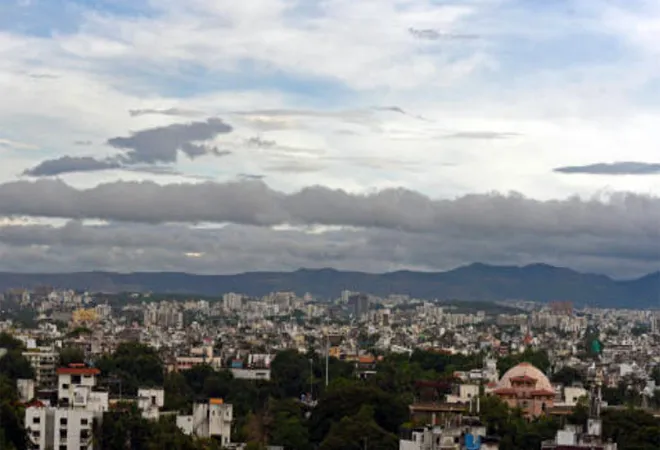-
CENTRES
Progammes & Centres
Location

Pune Municipal Corporation (PMC) recently came out with a policy on amenity spaces in the city. These comprise, amongst other things, statutorily mandated spaces carved out as a percentage of layouts, subdivisions, or group housing schemes. The local rules mandate that the amenity spaces must be exclusively used as parks, playgrounds, sports complexes, convenience shopping, parking lots, schools, health clubs, dispensaries, post offices, police stations, and such other purposes. The PMC policy seeks their privatisation, primarily on account of the municipal corporation not being able to develop these itself. It has, therefore, adopted the public-private partnership (PPP) model that allows development without municipal financial investment.
The standing committee has cleared the policy, and it will now be tabled before the Corporation’s General Body for approval. Its passage is likely to be easy since the same political party (i.e., BJP) holds sway over the General Body as the standing committee. The policy proposes to lease out 270 amenity spaces comprising 85 reserved plots and 185 other private spaces acquired from the layouts by the PMC by granting the owners additional construction potential through a higher Floor Space Index (FSI). It needs to be noted that these layout amenities are not part of the public amenities mandated under the city’s Development Plan (DP). The primary responsibility of developing them lies with the layout owners.
The policy proposes to lease out 270 amenity spaces comprising 85 reserved plots and 185 other private spaces acquired from the layouts by the PMC by granting the owners additional construction potential through a higher Floor Space Index (FSI).
The disposal of municipal property with certain conditionalities is allowed by Section 79 of the Maharashtra Municipal Corporation (MMC) Act. It states that, “with the sanction of the Corporation, the Commissioner may lease, sell, let out on hire, or otherwise convey any property, moveable or immoveable, belonging to the Corporation” (Section 79 c). The disposal of any of such property cannot be at a consideration less than the current market value. Moreover, no property vesting in the Corporation “shall be leased, sold, or otherwise conveyed in such a manner that the purpose for which it is held will be prejudicially affected”. In the matter under discussion, the proposal is to lease these properties for 30 years. The market value can be calculated by using the annual ready reckoner rate published by the state government.
Despite legal provisions allowing the cited variety of disposal, NGOs and resident associations of the city have challenged the policy in the Bombay High Court and have parallelly approached the Urban Development Department of the state government for its annulment. They want the amenity spaces developed by the corporation itself. They fear that “the quality of life in Pune will permanently deteriorate if the PMC is allowed to proceed on its move.” The policy and its implementation do not seem destined to have a smooth passage.
The PMC’s revenue has gone down drastically due to the pandemic and this will help generate income.
The argument advanced by the ruling political dispensation is that PMC has landed in financial difficulties, especially in the backdrop of the economic downturn post-COVID-19. In its struggle to find resources, such privatisation will shore up PMC’s finances. “The PMC’s revenue has gone down drastically due to the pandemic and this will help generate income,” said Hemant Rasane, Chairperson of the standing committee. He added that the implementation of the proposal would fetch an estimated INR 1,753 crores. “The PMC doesn’t have money to develop these places and if left vacant, there are chances of encroachment.”
It is common that the national slugfest amongst political parties radiates downwards and is replicated in local politics. Opposition leaders, as expected, have condemned the move. NCP MP Vandana Chavan suggested that the PMC prepare a draft master plan to develop these spaces. “Instead, the civic body is ignoring the growth of urban forestry and promoting concrete jungles on amenity spaces with such a proposal”. Another NCP leader, Prashant Jagtap, questioned whether they (the ruling party leaders) have a proper plan to lease out the space. “How will they check the usage for which they have been leased out? How will they recover the land after 30 years? If they lease out the land and the respective party builds a permanent structure, then how will the PMC recover it?”
The inclusion of tourism as the key objective in the policy may enable the PMC to approve the proposal without recourse to the state government.
Former Chief Minister Devendra Fadnavis advised going for a longer lease of these properties as the current 30-year lease proposal is likely to get a limited response and fetch inadequate revenue. Such a move would require state approval which may be a long, drawn-out affair. However, the inclusion of tourism as the key objective in the policy may enable the PMC to approve the proposal without recourse to the state government. Following this advice, the local administration is busy studying the local applicability of the state tourism policy.
While political squabbles on any issue are routine, what deserves notice is that citizen groups have voiced their open opposition to the proposal. Vivek Velankar of Sajag Nagrik Manch has demanded that the proposal be scrapped. “The civic body cannot wash its hands off its responsibility to develop amenity spaces,” he argued. Vaishali Patkar of the Aundh Vikas Mandal was equally forthright, terming leasing out amenity spaces to private parties to generate revenue as “not the right approach.” The PMC had reportedly earlier leased out approximately 1,981 properties but failed to recover rent of INR 53.50 crores that was due from these properties.
PMC is first and foremost obligated to deliver services to the citizens and provide the city with good governance. On the developmental side, its principal responsibility is to implement the DP.
The arguments advanced on all sides have merit. It is uncontested that Urban Local Bodies (ULBS), like so many other institutions, businesses, and individuals, have financially suffered during the pandemic. It is also true that privatisation will lead to substantial construction on these amenity spaces since private developers would not be in the game for charity but to make a profit. There are fears that many of these would land in the hands of local politicians who would exploit them for profitmaking. However, the fundamental question that needs to be asked is—why did the PMC acquire these spaces when it was not its primary responsibility to develop them?
PMC is first and foremost obligated to deliver services to the citizens and provide the city with good governance. On the developmental side, its principal responsibility is to implement the DP. Many of the public spaces reserved in the DP lie undeveloped since the PMC does not have the financial muscle to acquire reservations put on private lands for public amenities. When its performance regarding the DP, which it is obligated to implement, is so pitiable, it is obvious that taking on additional responsibility that it was not mandated to engage in was unwise. Evidently, the consequences of the initiative were not studied, and PMC took up much more than it could chew.
Additionally, using the grant instrument of additional FSI to layout owners loaded the city with heightened construction, thereby, increasing built density beyond the normal limits. Furthermore, the key objective of amenity spaces is most likely to be compromised since PMC would have to allow a percentage of construction to the developer on the amenity space that would make good his investment and earn him a profit. This uncalled for and additional unmandated responsibility smacks of a lack of wisdom. To some, however, there appears method in this madness. The local Congress leader Aba Bagul alleged that “the decision appears to have been taken to serve the interests of some leaders in the ruling BJP and developers.” Undoubtedly, this cannot be cited as a sterling example of good urban governance. It is high time that ULBs eschewed digression and concentrated on their core responsibilities.
The views expressed above belong to the author(s). ORF research and analyses now available on Telegram! Click here to access our curated content — blogs, longforms and interviews.

Dr. Ramanath Jha is Distinguished Fellow at Observer Research Foundation, Mumbai. He works on urbanisation — urban sustainability, urban governance and urban planning. Dr. Jha belongs ...
Read More +